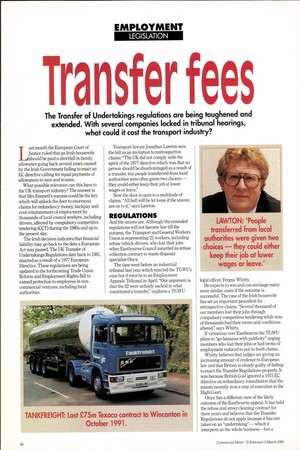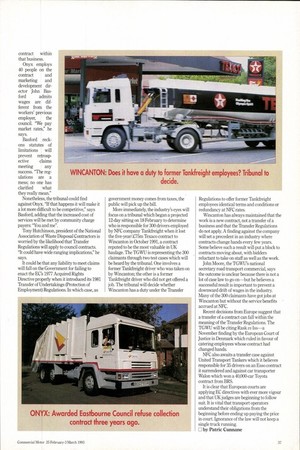Transfer tees The Transfer of Undertakings regulations are being toughened
Page 38

Page 39

If you've noticed an error in this article please click here to report it so we can fix it.
and extended. With several companies locked in tribunal hearings, what could it cost the transport industry?
Tjast month the European Court of Justice ruled that an Irish housewife should be paid a shortfall in family allowance going back several years caused by the Irish Government failing to enact an EC directive calling for equal payments of allowances to men and women.
What possible relevance can this have to the UK transport industry? The answer is that Mrs Emmett's success could be the key which will unlock the door to enormous claims for redundancy money, backpay and even reinstatement of employment by thousands of local council workers, including drivers, affected by compulsory competitive tendering (CCT) during the 1980s and up to the present day.
The Irish decision indicates that financial liability may go back to the date a European Act was passed. The UK Transfer of Undertakings Regulations date back to 1981, enacted as a result of a 1977 European Directive. These regulations are being updated in the forthcoming Trade Union Reform and Employment Rights Bill to extend protection to employees in noncommercial ventures, including local authorities. Transport lawyer Jonathan Lawton sees the bill as an invitation to restrospective claims: "The UK did not comply with the spirit of the 1977 directive which was that no person should be disadvantaged as a result of a transfer, but people transferred from local authorities were often given two choices — they could either keep their job at lower wages or leave."
Now the door is open to a multitude of claims. "All hell will be let loose if the unions are on to it," says Lawton.
REGULATIONS And the unions are. Although the extended regulations will not become law till the autumn, the Transport and General Workers Union is representing 22 workers, including refuse vehicle drivers, who lost their jobs when Eastbourne Council awarded its refuse collection contract to waste disposal specialist Onyx.
The case went before an industrial tribunal last year which rejected the TGWU's case but it returns to an Employment Appeals Tribunal in April. "Our argument is that the 22 were unfairly sacked in what constituted a transfer," explains a TGWU legal officer, Fergus Whitty.
He expects to win and can envisage many more similar cases if the outcome is successful. The case of the Irish housewife has set an important precedent for retrospective claims. "Several thousand of our members lost their jobs through compulsory competitive tendering while tens of thousands had their terms and conditions altered," says Whitty.
If victorious over Eastbourne the TGWU plans to "go bananas with publicity" urging members who lost their jobs or had terms of employment reduced to put in fresh claims.
Whitty believes that judges are giving an increasing amount of credence to European law and that Britain is clearly guilty of failing to enact the Transfer Regulations properly. It was because British Coal ignored a 1975 EC directive on redundancy consultation that the miners recently won a stay of execution in the High Court.
Onyx has a different view of the likely outcome of the Eastbourne appeal. It has held the refuse and street cleaning contract for three years and believes that the Transfer Regulations do not apply because it has not taken on an "undertaking"— which it interprets as the whole business—but a contract within that business. Onyx employs 40 people on the contract and marketing and development director John Bas ford admits wages are different from the workers' previous employer, the council. "We pay market rates," he says.
Basford reckons statutes of limitations will prevent retrosp ective claims meeting any success. "The regulations are a mess; no one has clarified what they really mean."
Nonetheless, the tribunal could find against Onyx. "If that happens it will make it a lot more difficult to be competitive," says Basford, adding that the increased cost of services will be met by community charge payers: "You and me".
Tony Hutchinson, president of the National Association of Waste Disposal Contractors is worried by the likelihood that Transfer Regulations will apply to council contracts. "It could have wide ranging implications," he says.
It could be that any liability to meet claims will fall on the Government for failing to enact the EC's 1977 Acquired Rights Directive properly when it introduced its 1981 Transfer of Undertakings (Protection of Employment) Regulations. In which case, as government money comes from taxes, the public will pick up the bill.
More immediately, the industry's eyes will focus on a tribunal which began a projected 12-day sitting on 18 February to determine who is responsible for 300 drivers employed by NFC company Tankfreight when it lost the five-year/£75m Texaco contract to Wincanton in October 1991, a contract reputed to be the most valuable in UK haulage. The TGWU is representing the 300 claimants through two test cases which will be heard by the tribunal. One involves a former Tankfreight driver who was taken on by Wincanton; the other is a former Tankfreight driver who did not get offered a job. The tribunal will decide whether Wincanton has a duty under the Transfer Regulations to offer former Tankfreight employees identical terms and conditions or redundancy at NFC rates.
Wincanton has always maintained that the work is a new contract, not a transfer of a business and that the Transfer Regulations do not apply. A finding against the company will set a precedent in an industry where contracts change hands every few years. Some believe such a result will put a block to contracts moving about, with bidders reluctant to take on staff as well as the work.
John Moore, the TGWU's national secretary road transport commercial, says the outcome is unclear because there is not a lot of case law to go on—but he believes a successful result is important to prevent a downward drift of wages in the industry. Many of the 300 claimants have got jobs at Wincanton but without the service benefits accrued at NFC.
Recent decisions from Europe suggest that a transfer of a contract can fall within the meaning of the Transfer Regulations. The TGWU will be citing Rask vs Iss—a November finding by the European Court of Justice in Denmark which ruled in favour of catering employees whose contract had changed hands.
NFC also awaits a transfer case against United Transport Tankers which it believes responsible for 35 drivers on an Esso contract it surrendered and against car transporter Walon which won a 40,000-car Toyota contract from BRS.
It is clear that European courts are applying EC directives with ever more vigour and that UK judges are beginning to follow suit. It is vital that transport operators understand their obligations from the beginning before ending up paying the price in court. Ignorance of the law will not keep a single truck running.
E3 by Patric Cunnane












































































